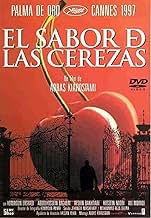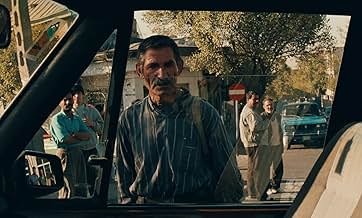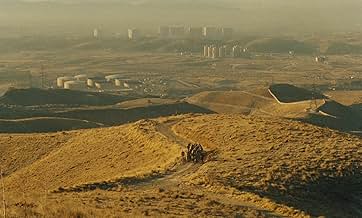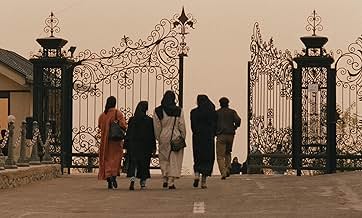Un Iranien conduit son camion et recherche quelqu'un qui l'enterrera tranquillement sous un cerisier après son suicide.Un Iranien conduit son camion et recherche quelqu'un qui l'enterrera tranquillement sous un cerisier après son suicide.Un Iranien conduit son camion et recherche quelqu'un qui l'enterrera tranquillement sous un cerisier après son suicide.
- Réalisation
- Scénario
- Casting principal
- Récompenses
- 3 victoires et 5 nominations au total
Avis à la une
There are critics who call this kind of untouched-by-art realism genius, who say that Kiarostami is making us think, reconsider the very nature of cinema, and so on. To my mind, the message of the film-- the taste of cherry makes life worth living-- is no more or less profound than, say, Woody Allen rattling off a few of the things that make life worth living in Manhattan, or the epiphany the kid in American Beauty gets from a plastic bag. (Likewise the message that it's all only a movie. Never woulda guessed.) And critics who find such a message shallow in a piece of slick entertainment, but deep when it's in a deliberately unentertaining art film, need to reexamine their critical principles, or lighten up a little-- or at least go see again the work of real art Kiarostami alludes to in his title, Wild Strawberries, which has more depth of characterization and emotional richness in any five minutes than this manages to scrounge up in an hour and a half.
I was afraid that if I ended the movie where Mr. Badie laid down on his grave the spectator would be left with a great deal of sadness. Even though I didn't think the scene was really that sad, I was afraid that it would come out as such. For that reason I decided to have the next episode where we have the camera running as Mr. Badie was walking around. I wanted to remind spectators that this was really a film and that they shouldn't think about this as a reality. They should not become involved emotionally. This is much like some of our grandmothers who told us stories, some with happy and some with sad endings. But they always at the end would have a Persian saying which went like this "but after all it is just a story! . . . The very last episode reminds me of the continuation of life, that life goes on, and here the audience is confronted with the reality they had hoped that Mr. Badie would be alive and there he is a part of nature and nature still continues and life goes on even without Mr. Badie. And if one could really think about being or not being present in life, or if one thinks about it in terms of the real implication of such presence, one might not in fact engage in committing suicide at all. The person committing suicide might think that s/he is taking revenge from the society, nature, life, powers to be, and so on. But s/he don't realize that after a suicide life still goes on and things stay the way they are. I could interpret this in a different way. If my audience is as creative as I imagine them to be, they can take this in a variety of interpretations and I can sit here and every time make a different interpretation of it, as every time one can creatively reinterpret the reality. "
Suicide, in itself, is a ready and obvious turn-off for many viewers, probably. And coupled with the apparent treacle-like pace of the narrative and the repetitive scenes of a lone man, Badii (Homayoun Ershadi), driving in and around hills outside Tehran, this story gives a whole new dimension to the idea of going over the same ground, again and again, to prove a point. And all the while we, as viewer, are inside the auto for most of this movie, up close and very personal....
But to avoid seeing this movie would be a big mistake, in my opinion.
I say that simply because the idea of suicide has probably occurred to most people, including myself, at some time in their lives. Whether that idea was part of Kiarostami's motivation for making this movie, we will never know, of course. I dare say it occurred to him, though.
At the first frame, we're in Baddii's well-worn Range Rover as he drives, his face set, his gaze wandering here and there, searching for a likely assistant for his plan to kill himself. In sequence, he stops a variety of men - a seminarian, a young soldier, a security guard; each man and Badii converse about his need to have somebody help him to suicide, Badii describing what a helper must do. Each time, Baddi has no success until, with a blindingly quick jump-cut, an old man, Bagheri (Abdolrahman Bagheri) is in the car, a helper who finally agrees to abide by Badii's wishes.
So, after taking Bagheri to close where he lives, Badii drives off, content that he has secured a deal; rapidly, however, he drives back in a fluster, as doubts creep into his mind. Frantically, he walks around the area until he finds the old man Bagheri to seek further assurance he will indeed help Badii next morning. Somewhat annoyed, the old man again gives his solemn promise. And stalks off.
Slowly then, Badii returns to his home/apartment, makes his final preparations, makes a point of turning off all the lights as he leaves, locks the door, leaves his car, and then takes a taxi back to the cherry tree, he had previously selected, at which he will terminate his life during the night, and as thunderstorms - a much-overused trope perhaps - begin.
It is there, then, that I will leave you to find out why Bagheri decided to help, and about Badii's fate that night. And about an absolutely unexpected ending.
It's a bleak story, but one that is played out in too many ways by thousands every day, more or less in every country on the planet, probably. Perhaps then, Kiarostami is urging us to think upon that more often as we all traverse our own daily ups and downs - and especially in relation to those who are nearest. Once seen, this is not a movie to forget.
Recommended for all, except toddlers obviously. Give it eight out of ten.
Through the dialogue between different people from different classes, everyone has his own attitude about "life & death". I think we can't say which is right & which is wrong. Abbas only gives it to us & let us think for ourselves.
Every scene is simple & ordinary, but has a certain strange fascination. I have seen "Through The Olive Trees" before (also directed by Abbas). To be honest, I don't like it, although it's said to be a good film. But this one is different. "Go see it" is what I want to say.
Le saviez-vous
- AnecdotesThe film was shot without a proper script, relying on improvisations.
- GaffesIn the opening scene, as Mr. Badhi is driving past laborers looking for work, the same middle-aged white haired man, wearing a checkered sweater vest, is seen twice.
- Citations
Mr. Bagheri: If you look at the four seasons, each season brings fruit. In summer, there's fruit, in autumn, too. Winter brings different fruit and spring, too. No mother can fill her fridge with such a variety of fruit for her children. No mother can do as much for her children as God does for His creatures. You want to refuse all that? You want to give it all up? You want to give up the taste of cherries?
- ConnexionsFeatured in Especial Cannes: 50 Anos de Festival (1997)
Meilleurs choix
- How long is Taste of Cherry?Alimenté par Alexa
Détails
- Date de sortie
- Pays d’origine
- Sites officiels
- Langue
- Aussi connu sous le nom de
- Taste of Cherry
- Lieux de tournage
- Sociétés de production
- Voir plus de crédits d'entreprise sur IMDbPro
Box-office
- Montant brut mondial
- 11 207 $US
Contribuer à cette page
























